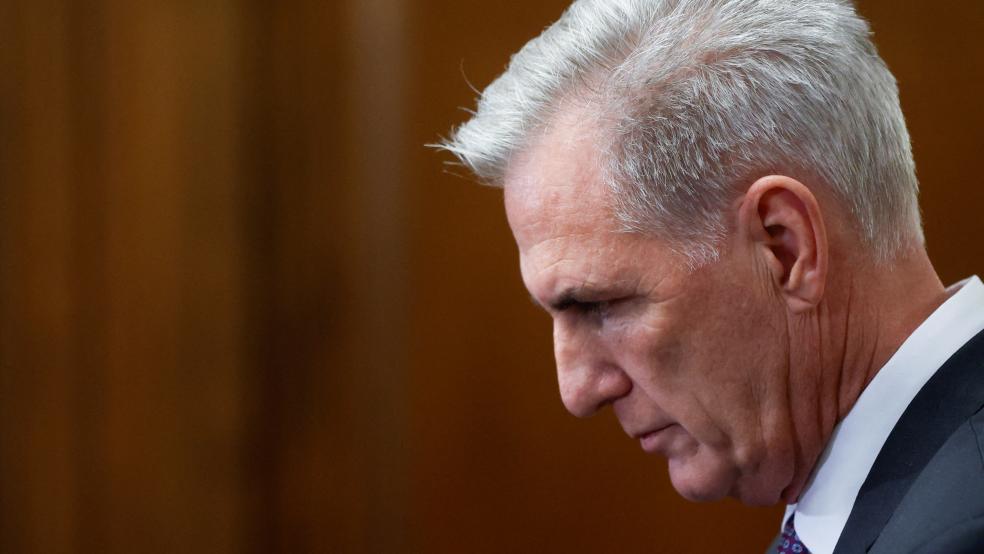What a waste. With a looming September 30 deadline to prevent a government shutdown, the House has now squandered two weeks because of Republican infighting.
Since House lawmakers returned last week from a 47-day August recess, McCarthy has tried various tactics to corral his most quarrelsome members and unite his conference behind a stopgap measure to prevent a shutdown and keep Republican rebels from seeking his ouster. To appease the far-right wing of his party, he announced an impeachment inquiry into President Joe Biden, bypassing a full vote on the House floor. He dared the rebels to try to pry away his speaker’s gavel, dropping some f-bombs as he did it. He then essentially capitulated to the conservatives’ demands on federal spending levels, trying to find a deal that could be approved by his narrow majority.
None of it worked. None of it quelled the mutiny in McCarthy’s ranks or made any real progress toward averting a shutdown, as hardline Republicans continue to block a short-term extension of federal funding and the speaker continues to focus on his right flank rather than entertain the possibility of a bipartisan agreement.
McCarthy had hoped to pass a Republican stopgap bill this week, laying down a marker for negotiations that could wring some concessions from Senate Democrats. Instead, he may have to decide what to do with a bill that the Senate sends over.
What’s next: The House is now set to take up individual spending bills when it returns on Tuesday, starting with four of the 11 appropriations bills that still must be passed: those covering Homeland Security, the State Department and foreign operations, the Defense Department and Agriculture. McCarthy said that he plans to strip out some $300 million for Ukraine from the Defense spending bill and hold a separate vote on that aid in hopes that will help Pentagon funding pass after two failed procedural votes.
It will be challenging for House Republicans to speed through the outstanding appropriations bills in the final days before the September 30 deadline —and almost entirely pointless. Even if they can pass those spending bills at levels in line with what GOP conservatives are demanding, it would not address the immediate task at hand: preventing a shutdown.
McCarthy said Friday that he still aims to pass a partisan short-term funding bill next week. “I still believe if you shut down, you’re in a weaker position,” McCarthy told reporters. “You need the time to fund the government while you pass all the appropriations.”
But he reportedly skirted around a question about whether passing the four GOP appropriations bills will build support among his holdouts for a Republican stopgap spending bill.
The Senate prepares to move first: The Senate, meanwhile, is preparing to push ahead with its own bipartisan spending bill, which is expected to also include Ukraine aid funding that House conservatives oppose. Senate Majority Leader Chuck Schumer has laid the legislative groundwork to enable his chamber to pass a spending patch that can be sent to the House.
“Hopefully the House will see that working in a bipartisan way is best for the American people and best for Speaker McCarthy. He can’t let this small group of hard-right people, who are almost fanatics, who want the government to shut down despite the harm it does to the American people, to govern the whole body,” Schumer told CNN.
Schumer added that he’s working with Senate Minority Leader Mitch McConnell on the details of a continuing resolution. “Leader McConnell and I are talking and we have a great deal of agreement on many parts of this,” Schumer said. “It’s never easy to get a big bill, a CR bill done, but I am very, very optimistic that McConnell and I can find a way and get a large number of votes both Democratic and Republican in the Senate.”
Still, the Senate process could eat up most or all of the time remaining before the Saturday deadline, especially since Republican Sen. Rand Paul has already said he would oppose speedy passage of a bill that provides more money for Ukraine.
The bottom line: McCarthy at some point is likely to again face a choice: Pass a short-term spending bill with help from Democrats, which would prevent or end a shutdown but also put his job at risk, or continue trying to placate conservatives and allow federal agencies to go dark. McCarthy’s actions thus far provide little indication that he would buck his hardliners.





